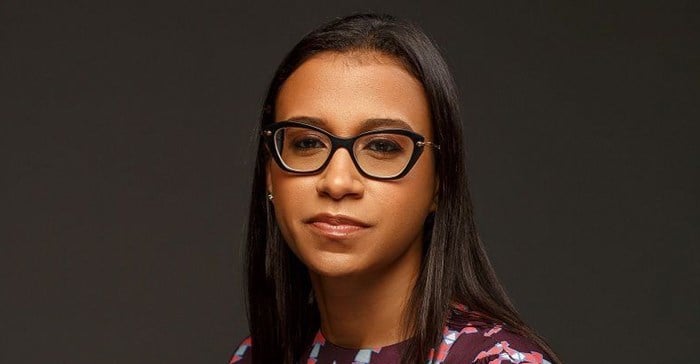
Source: Supplied. Alice Tomdio, chief financial officer at Yellow Card Financial.
With over 320 million crypto users worldwide, it is easy to see the disparity in the percentage of users.
However, the good news is that this inequality looks set to change. According to a report by Fortune, BTC Markets - an Australian bitcoin and cryptocurrency exchange saw a 175% increase in female users last fiscal year, dwarfing the 80% increase it saw in male users.
As the dynamics of representation and financial inclusion are changing, there is increased hope for the influence and, eventually, benefits that can be secured by women in this space.
Two women at the top of Yellow Card financial’s leadership team are Alice Tomdio, chief financial officer, and Mandy Naidoo, chief compliance officer. Yellow Card is Africa’s fastest-growing crypto exchange, available in 16 African countries. In their respective roles, these two women are among a small group of thought-leaders paving the way for African women in crypto.
"We need to have more females embrace this technology, know how to use it, and be proud to talk about it," says Tomdio.
She was speaking at a webinar Paving the Way for Women in Crypto.Tomdio was joined in conversation by Lasbery Oludimu, director of legal services at at Yellow Card; Roselyne Wanjiru, digital economist and blockchain consultant.
Rethinking the way we see money
"Are we really thinking about money today the way we should?" asks Wanjiru.
"In the past, we would hear stories about being able to trade virtually anywhere with anything you had, and money was not a limitation. But as the years went by, money came into the equation and so did intermediaries as we know them today.
"When we have issues such as inflation, we need to ask ourselves if the intermediaries we have had over the years can be trusted to lead in matters such as inflation, which is to some extent, beyond their control?
"Case in point: $1,000 In Kenya back in the 80s and 90s, could actually buy you an acre of land even, and much more land than that in some places. The same $1,000, even 10 years ago, could get you a decent investment in the stocks. But with $1,000 today, I don't think you can actually make a sizable property investment with that.
"This is where we have to ask ourselves: if something like inflation can actually erode the power of a unit money, then it means that we need to rethink how we think about income.
"One of the principles I love about digital currencies, is that their supply is limited, and it means that no one has the individual power to increase or to change the amount of a specific digital currency once it's determined. (And we have cryptocurrencies too. Many people have argued against them, as they don't have underlying value, but there's a value in terms of being able to see an increase in their value over time.)
"If we want to move from an uncontrolled supply of money to a controlled supply of money, shouldn't it be that finance should be relooked at in terms of how it can better serve communities in the future?"
Better serving communities
Oludimu explains just how cryptocurrency is already a part of daily life and serving communities.
- "From the data on our Yellow Card app, I see people use crypto to send funds to their loved ones on a daily basis across Africa. The app enables users to send and receive money through crypto rails in their local currency. So with this app, I can actually send funds to a friend or a family friend or a family member in Kenya, and the person will receive the funds in Kenya shillings.
- "Cryptocurrency is used as a means of payment. People pay for goods and services with cryptocurrency. A few weeks ago, a colleague of mine recently discovered wine shops that accept cryptocurrency. So you can imagine walking into a wine shop and picking two bottles of wine and you ask the vendor, "What is your USDT Wallet account?", and it's provided to you. And you open up your phone and make the transfer and the transaction is completed.
- "Crypto is being used as a means of currency exchange.A few months ago, I went to Dubai and before I left I was unable to process my personal travel allowance in Nigeria. Each time you leave Nigeria, you're permitted to apply for a personal travel allowance of $4000. So before I travelled to Dubai I couldn't get that $4,000 because there was a long queue at the bank.
"When I got to Dubai, I met a colleague of mine who resides there and got some funds from him. I requested a Naira bank account so I could transfer the money I'd loaned back to him. He told me to rather send the funds to his USDT Wallet. There was no need for me to exchange Naira into Dollars first to do so.
- "Another daily practical use of crypto is as a means of investments, so I have a colleague who, on a monthly basis, uses a percentage of her salary to buy Bitcoin, as a saving for her son [when he turns 18].
- "Some foreign companies are paying their employees in cryptocurrency. If you work for a company that has offered to pay you in USDT, you can actually convert it in your local currency, and the rate is even better than when you're paid in USD."
Education is key to increased adoption
But for more women to adopt cryptocurrency there'll need to be lots more education, warns Tomdio.
"Women can't really venture into Bitcoin or other cryptocurrencies, if they know nothing about them."
Having women as mentors who know a lot about the sector is helpful, she says, as is linking to the Yellow Card Academy where beginners learn all about crypto trading and how to avoid scams.
Ultimately, where the issue of women in crypto is concerned, it all boils down to how willing women are, as individuals, to delve into a space and an enterprise filled with endless possibilities.
"If you get into crypto," Tomdio adds, "you’ll realise that it's not necessarily a risky move in the way that people would think about it. It’s your behaviour towards tech in general, perhaps that'll determine whether it's sustainable.”

























